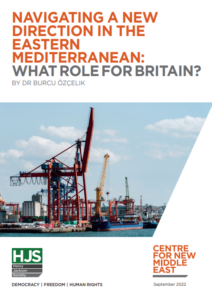Global Britain is uniquely placed and must use her leverage in the Eastern Mediterranean to cut our dependence on Russian gas, according to The Henry Jackson Society.
With the majority of Europe suffering from a reduced supply of gas following Russia’s invasion of Ukraine, the report contends that the interests of the UK’s energy security resides with leveraging its diplomatic potential in the Eastern Mediterranean.
Drawing specifically on the UK’s relationship with Cyprus, the paper argues by helping to foster dialogue surrounding the reunification of the island, Britain could unlock decades of friction between the NATO allies in the region thus securing the possibility of new gas lines to mainland Europe.
By helping to resolve the partition of Cyprus, the UK would clear the field of the many roadblocks in the region, allowing for productive dialogue with Turkey over the location of a new eastern Mediterranean pipeline.
The report also makes the case for quick action arguing that other major nations are looking at the potential of the region as a new supplier of gas. Specifically, the paper highlights the risk that France may seek to overtake British influence in the area and status in Cyprus.
For Dr Burcu Özçelik, the author of the report, Britain could risk losing out on the unique relationship it has with Cyprus, both as a guarantor of the island and as fellow member of the Commonwealth.
She said: “While Britain is not technically dependent for its gas supply on European pipelines, the problem is that now Britain must compete with other gas-hungry countries for a reduced supply of gas globally. This has made Britain’s energy security highly vulnerable.
“The possibility that the Eastern Mediterranean could diversify the supply of natural gas to meet European energy needs is now once again on the table. Given the urgency of the current moment, with skyrocketing energy prices, rising demand and potential disruptions to global supply chains, it may be time to put longstanding regional political disputes to one side and focus on commercially and technically viable energy cooperation that can ease up the pressure on Europe and Britain.’
“Given its history and continued strategic interest in the region, Britain has the potential to assume a more significant and constructive diplomatic role over the future of the Eastern Mediterranean, including over energy geopolitics.”



